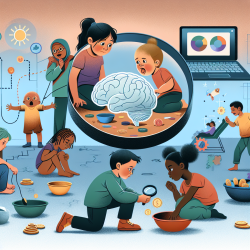Introduction
In the ever-evolving landscape of speech-language pathology, it is crucial for practitioners to stay informed about the broader societal issues that can impact child development. One such issue is labor exploitation, which has been exacerbated by the COVID-19 pandemic. The research article "Modern Slavery and Labor Exploitation During the COVID-19 Pandemic: A Conceptual Model" provides valuable insights into this global health problem. This blog aims to help practitioners improve their skills by understanding and implementing the outcomes of this research.
Understanding the Conceptual Model
The research utilizes an ecological systems framework to explore the pathways leading to labor exploitation, particularly in sub-Saharan Africa. This model highlights the complex interplay between macroeconomic systems, institutions, and family factors that contribute to vulnerability. By understanding these pathways, practitioners can better address the social determinants affecting children's development.
Key Findings and Implications for Practice
- Macroeconomic and Institutional Factors: Economic instability and weak social institutions are significant contributors to labor exploitation. Practitioners should be aware of these factors when designing interventions for children from vulnerable backgrounds.
- Family Dynamics: Economic precarity and family dysfunction increase the risk of exploitation. Speech-language pathologists can incorporate family-centered approaches to support children in these environments.
- COVID-19 Exacerbations: The pandemic has intensified existing vulnerabilities, leading to increased acceptance of exploitative labor conditions. Practitioners should consider the pandemic's impact when assessing and planning therapy for affected children.
Encouraging Further Research
The conceptual model developed in this research highlights the need for interdisciplinary research on multilevel interventions. Practitioners are encouraged to engage in further research to identify modifiable factors and strategic points of intervention. By doing so, they can contribute to the development of effective solutions to prevent labor exploitation and improve outcomes for children.
Conclusion
Understanding the pathways to labor exploitation and the impact of the COVID-19 pandemic is essential for speech-language pathologists committed to creating positive outcomes for children. By integrating these insights into practice, practitioners can enhance their skills and contribute to the broader effort to address this pressing global health challenge.
To read the original research paper, please follow this link: Modern slavery and labor exploitation during the COVID-19 pandemic: a conceptual model.










